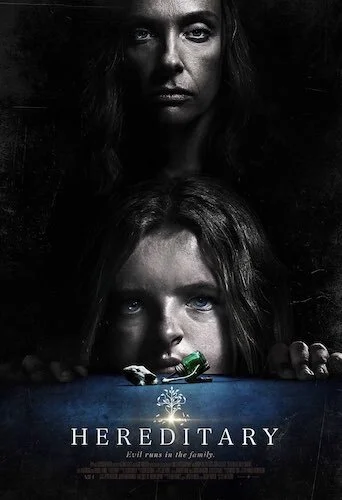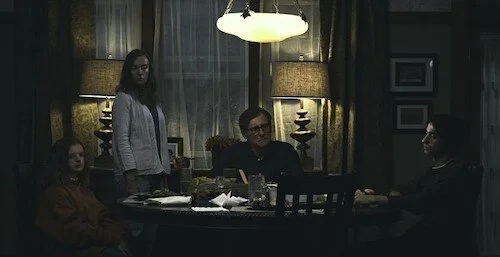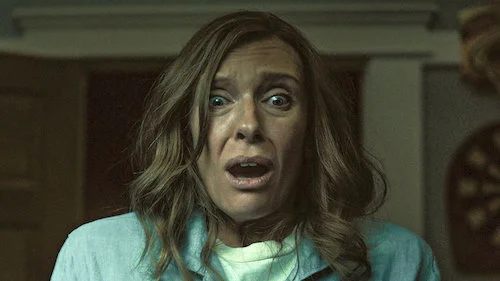Hereditary: 31 Days of Horror
For all of October, we will review horror films. Submit your requests here, and you may see your picks selected!
In 2020, Ari Aster has become the master of horror, particularly with how he is able to create dread and impending doom in his films. Keep in mind that he’s only been making feature films since 2018, considering that Hereditary is his debut. Just this film and Midsommar alone have allowed Aster to become the go-to auteur for intense and disturbing hyper dramas, that usually dive into psychological (and literal) horrors. So, when Aster says he wants to tackle a comedy film next, we can only suppose what that could entail. As it stands, Aster feels like the second coming of Darren Aronofsky: a provocative filmmaker that is able to get the very best work out of their cast and crew. This is such the case in Hereditary, which is extremely well made in basically every way.
Even non-horror fans could agree that Toni Collette delivers a once-in-a-lifetime performance as mother Annie Graham, who is seeing her family die before her very eyes. I’d dare to go as far as to say she gives one of horror’s greatest performances; two years later isn’t too early to say, if this is a true statement. Collette contains all of the must-haves of horror films, including visible fear, identifiable panic, and the perfect neutral phase to counter these moments. Then, Collette goes even further, becoming an all-too-real rendition of misery and complete devastation that we’ve all experience from others (or have experienced ourselves) in our darkest moments. Her cries aren’t that of a scream queen, but of a family member who is so hurt by loss, that she no longer has life in her own self.
Family gatherings in Hereditary feel less like a time to catch up, and more like a pondering of what will happen next.
This would be one thing if Hereditary was so-so and catered to Collette’s performance. But, my friends, that is not the case. Even though Collette leads this film of agony, Hereditary is so powerful in most ways, that this is not an acting vehicle by any means. Right off the bat, the house looks either like a doll-sized variant or a diorama. Either way, we feel like puppeteers or higher beings overlooking these mortals as they carry on their daily activities. An other worldly force is established. It’s an early indication that something outside of our own reality is going to be at play here. Eventually, mother Annie seemingly goes insane from depression, believing that she has ways to connect with the dead, including her loved ones. Are we meant to chastise her? The film eased us in to another dimension of sorts, so Aster provides us this curiosity, as to not ridicule someone going through the worst moments of their lives.
Aside from the incredibly vicious deaths, Hereditary manages to keep upping the ante by pushing us further and further away from our comfort zones. Long before we even reach these moments, the film broods so much that we feel a deeply unsettling feeling. Our stomach churns not from scares or grossness, but from anguish; watching Hereditary feels more like you’re scared to deliver bad news (which happens, by the way) than you’ve seen a ghost. It’s a unique experience whilst watching a horror film, and it felt authentically signature to Aster before we even got to know the guy; after Midsommar, this is beyond confirmed. Still, leading up to the more paranormal moments feels like we ourselves are going batty, because we are so stricken by grief as well.
Toni Collette gave one of the best performances of the 2010’s, and in all of horror, in Hereditary.
Leading up to a twist of twists, Hereditary finally pulls a fast one on us. I know this climax is extremely polarizing, and it either solidified the film as an immediate horror classic, or it ruined what could have been a horror classic. For me, Hereditary gets wrapped up beautifully (in a disturbing way, of course). The overall theme of familial lineage only makes sense to have powers against our control being at the root of all of these nightmares; we don’t get to choose how we’re born and to whom, and that’s precisely the problem for specific characters here (I don’t want to give too much away to those that haven’t seen the film). If Alfred Hitchcock ruined showers in Psycho, and Steven Spielberg made swimming at the beach tumultuous with Jaws, then Ari Aster made being a part of a family tree hell with Hereditary; essentially, that’s implying that it can be a curse just being alive. I think the extra oomph at the end also helps to alleviate Hereditary of any bogus claims that some viewers may push upon it about what it is trying to say about family. Really, it’s just a horror film that goes against anything any of the characters have any control over, and that’s what makes it so frightening and relatable. Ari Aster sought out to relate the hardships of death and grieving with literal horror, and he succeeded well enough to make a decade-defining statement (or two, with Midsommar in mind).
Andreas Babiolakis has a Masters degree in Film and Photography Preservation and Collections Management from Ryerson University, as well as a Bachelors degree in Cinema Studies from York University. His favourite times of year are the Criterion Collection flash sales and the annual Toronto International Film Festival.








